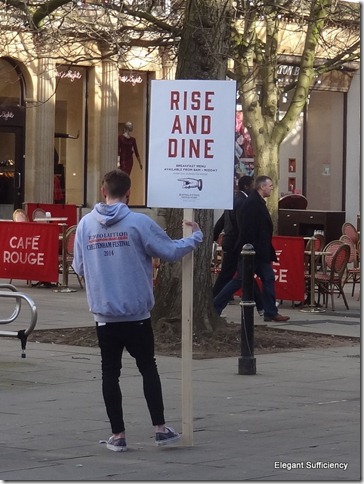A tale of two tribes
I was in Cheltenham unusually early yesterday morning. For most of us it was a normal Tuesday morning and the majority were going about their everyday business as usual. But there were young men with signs here and there, advertising breakfast.
The names on the street were William Hill, Paddy Power and Betfred and the biggest pile of newspapers in WH Smith was the Racing Post, with an only slightly smaller pile of the Irish Times alongside.
Some young women were dressed in more eyecatching outfits and were attracting attention from the groups of (mainly) men, which is of course, exactly what they intended.
It’s Gold Cup week in Cheltenham and 50 000 race goers are heading to the town each day. Anyone with any sense steers well clear of the place during this week, unless they have a business, of course, in which case it’s quids in! But I have no sense, because I have to be in the town three days running. What was I thinking?
So, whilst the gents in their tweeds and polished shoes join the lads in their blue jeans and hoodies on the way to the racecourse and pass the jewellers’ windows packed full of tempting trinkets for spending the winnings later, I joined an altogether different tribe for a Crafts Council conference about Crafts Education and Training. Definitely no tweeds to be seen there!
But someone had yarn-bombed the hare and the minotaur in honour of the occasion and I thought that could be a good sign.
Sadly, though, I’m not sure it was. Wearing two hats at the conference – both my Adult and Community Learning cap and the always-chic WI version – I was in the minority it seemed. In a room full of “makers” and “craftsmen”, much of the talk was of the high level stuff, of degree courses and PhDs, of career artisans making a living from their skills and whilst I fully support the agenda to enable these talented people to enrich our lives with the fruits of their labour, I thought that the point was missed somewhere. In my more mundane world where many of those lofty ideals and the concept of haptic education would involve the use of a dictionary, it’s the Great British Sewing Bee which drives the agenda, an idea to use some recycled materials to create something for the garden or even the opening of a new wool shop in the local town. Most of the people I work with everyday are not looking for a new career when they begin their craft adventure, but life has a way of turning up the unexpected and occasionally a simple jewellery making class or learning the basics of upholstery can lead to unimagined career changes. And whilst I don’t want to be ageist about this, many of these people thought they’d completed their formal education some time ago but are returning, newly motivated to learn a new skill or to develop it further having acquired some experience along the way.
Unfortunately, this type of crafts education wasn’t really on the agenda and warranted a mere passing mention. What a missed opportunity to explore the lack of support for adult education classes in crafts, for encouraging the acquisition and passing on of traditional skills to the many, not just to the lucky few. If the Crafts Council were more willing to step down from the lofty heights from time to time and acknowledge the huge benefits of acquiring new craft skills and putting them to creative use in everyday life, we might get somewhere.
Wouldn’t it be great if the money which changed hands on the racecourse and beyond yesterday was available for crafts education? (Speaking in 2010, Peter McNeile, Cheltenham's director of sponsorship, said that his information suggested that around UK£1 million was being bet on each race on-site in cash alone. "We estimate that the total turnover on races during Festival week is about UK£500 million," McNeile said. "If you talk to any bookmaker, I think you'd find the normal turnover for a week would be between say UK£320 million and UK£350 million. There's a big, big spike there.")
What a good job quality of life isn’t measured in money.



